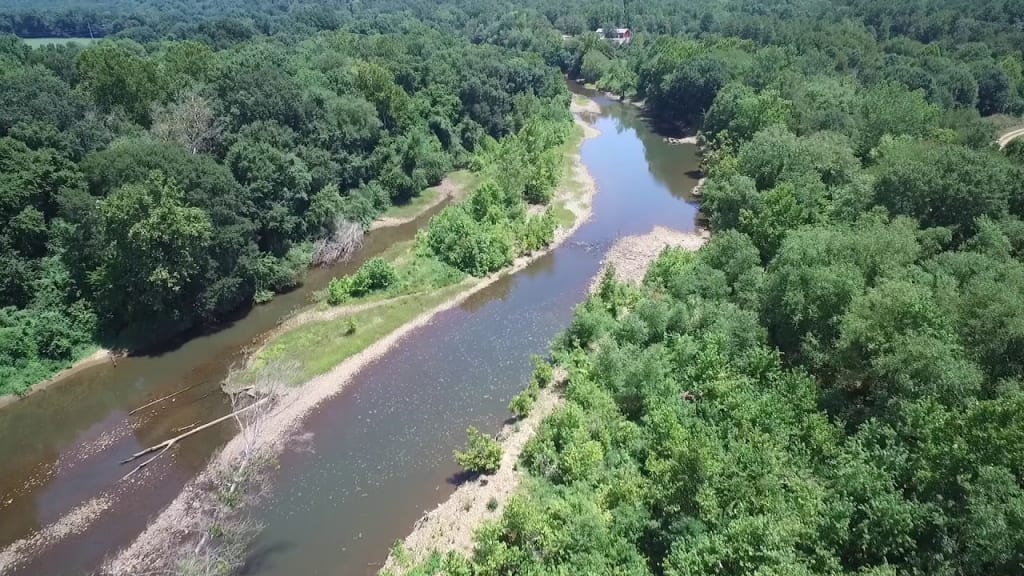The Success of a Stonefly Lure
An Ozark Story

Pops was an honest man, with one exception. September 4th, 1933. I remember the exact date because it was the only exciting day in the history of Chinqapin, Arkansas.
We were fishing in the bottoms of Short Creek, down the hollow from the logging road the folks in Little Rock called a highway. It was a generous word for a narrow, curvy dirt and gravel track that was impassable half the year. During the other half, Weatherford Timber’s two and a half ton trucks jammed it up so badly that no local ever used it. Pops blamed Weatherford for the road and more or less everything else wrong with the world.
We missed a portion of the excitement that day, being knee high in the middle of the creek. Pops worked the downstream, and I was up by the best eddies. Both of us hoped that the rainbows would hit stoneflies that day. They weren’t, of course. The only thing hitting were the mosquitoes.
It was godawful hot, even in the shade of the bottoms. Not yet nine in the morning and it was miserable. Pops cursed the heat a blue streak around his cigarette when he thought I was beyond earshot. Not that I’d’ve minded. In a few minutes, we both cursed enough for a month.
At half past eight, the Clayton Gang held up Chinqapin’s First Memorial Bank. Four minutes later with a chorus of gunshots, they ran out the front doors with sixty thousand dollars of Weatherford Timber’s payroll. A Pinkerton hired by Weatherford was not far behind them. If the Clayton Gang is unfamiliar, they were one of those desperado outfits of the Depression who fancied themselves to be the next Newton Boys or Bonnie and Clyde. The reason they quite reached the same acclaim is that about three-quarters of the mile down Roane County Highway Three, their Model A swerved to avoid one of those Weatherford two and a halves. The car sped down the hillside, taking out a swath of hackberries, privets, and sundry other shrubs. Part of the way down, it found a man-sized ledge of limestone and vaulted off that, shaving the crown off a black gum. In the second damnedest thing to happen that day, it came down neat as you please in a bramble next to Short Creek. The horn blared, died, and blared again, a death rale of the modern era.
Bodies and wits somehow intact, the Claytons dashed out of the car, through the creek, and across the bottomlands. They never gave Pops and I half a glance, just sort of disappeared in the tall grass. Our morning with the trout over, Pops rushed and stumbled toward the Model A thinking there might be a life to save. I yelled at him to leave it be, but he paid me no mind. Up the hill, the Pinkerton and loggers were hollering and cursing about half as bad as I was. When the car exploded, Pops dove into the water and must’ve torn a gash in his waders because he liked to have drown right then. He came up with his Barlow knife and cut the straps off his shoulders and pulled free. By then, he was as wet and muddy as a crawdad. He proceeded to crawl onto the bank and toward the car. I cursed him worse than I ever had before or since. He made no answer though. The smoke roiled off the car and covered him up. Thinking he was dead or on fire, I high-kneed through the water toward him.
Once by his side, I understood why he’d made no answer. Three dozen or so yards from the car was a black doctor’s bag that held a little black notebook with bank addresses from three states and sixty thousand dollars of Weatherford Timber payroll in five thousand dollar stacks.
Pops and I exchanged a look. I saw the thought in his eye, and he must’ve seen the question in mine. Did he want his only daughter to see his fall from grace or ignore sixty grand and the chance to stick it to the timber barons who ran his pa off the family land? He didn’t ponder it too long. His hand fished out twenty thousand and shoved them into his muddy hip pockets. The Pinkerton was halfway down the hill, hollering like a man ankle deep into a yellowjacket nest. Pops grabbed the bag, ran halfway to the car, and chucked the bag into the flames.
Once the Pinkerton arrived, we all stared at that burning heap of Detroit metal, and I realized that forty thousand dollars on fire smells just the same as sixty. It was the first time I ever thought my Pops a fool.
After they ushered us away from the scene, Pops and I took our rods and traipsed back home in silence. The whole way home, his hands never left his pockets. I’d’ve feathered into him if he had done otherwise though.
***
Ma made us strip before we even got in sniffing distance of her pristine porch. She fussed and moaned and just about wept at the state of Pops’ clothes. Nervous that she’d rifle though and find the cash, Pops went ahead and stepped on the porch, ensuring that Ma did weep. My estimation of Pops’ cleverness restored, I entered the house, and he sulked back toward the rain cistern.
While I combed out my hair and dreamed of what twenty thousand dollars might buy, I thought the smell of smoke was awful strong. I smelled it in my hair of course, but I’ll be damned if it didn’t smell like a fire was right outside the window. Pops choked off a scream, and I ran outside, where sure enough a fire was burning in the yard.
In hindsight, Pops ought to have remembered Ma loved a clean porch than she loved him. Morning, noon, and night for thirty years she swept that porch. It was bad enough that he muddied up the clothes she made him and cut the straps on his waders but tracking mud onto her porch was unforgivable. As Pops knelt there naked as a jaybird watching yet more cash burn that day, Ma told him over her shoulder, “I can make you more clothes, but I can’t make you listen.”
It took a week for Pops to look Ma in the eye. In all fairness, it took her two to let him touch her again.
Neither Pops nor I spoke a word about the fortune come and gone for the rest of his life. I know we felt it each time we returned to Short Creek or walked passed First Memorial Bank. In some way, I think he felt like he avenged the injustice against his pa. For my part, memories of trout come and gone and stolen mornings with the first person I ever loved took precedence. Ma forgave Pa and loved us more than she would’ve if she’d known were felons for about an hour.
Pops didn’t breathe a word about it to Ma until he lay on his death bed with cancer of the lung. When he finally confessed, she hit his arm and told him that with twenty thousand dollars she could’ve built a new porch.





Comments
There are no comments for this story
Be the first to respond and start the conversation.